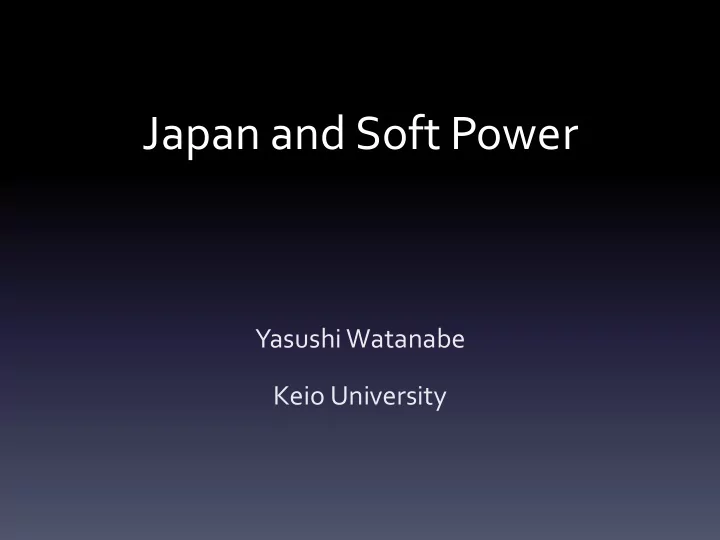

Japan and Soft Power Yasushi Watanabe Keio University
Power • the ability to influence the behavior of others to get the outcomes you want
Three Ways • Coercion • Payment • Attraction
Hard Power • Coercion (“stick”) --- military power • Payment (“carrot”) -- economic power
Soft Power the ability to attract and co-opt rather than coerce, use force or give money as a means of persuasion
Resources of Soft Power • Policy • Value • Culture
How Soft Power Works • Policy Goals • Value ✕ Contexts • Culture Tools
Sun Tzu (544-496 BC) • “To fight and conquer in all your battles is not supreme excellence; supreme excellence consists in breaking the enemy‘s resistance without fighting .” The Art of War
Why now ? • Military power is too strong and costly to resort to. • Economy is more interdependent for a country to dominate.
Anthony Eden (1897-1977) • “Even the best foreign policy will end in failure if the policy makers neglect their responsibility to explain the policy convincingly.”
Public Diplomacy Diplomatic efforts to wielding soft power in order to “shape realities” and “win the hearts and minds” of public or elite opinion in a foreign country.
Two Layers of Public Diplomacy Achieving policy goals Securing optimal policy environments
Tools of Public Diplomacy FAST INFORMATION SLOW INFORMATION • Policy Advocacy • Exchange Diplomacy • International Broadcasting • Cultural Diplomacy
For example 1940s 1950s
Propaganda ? • Propaganda is based on false information. • “The best propaganda is no propaganda”. • “Cultural Relations”
Daniel Bell (1919-2011) • “[T]he nation -state is becoming too small for the big problems of life, and too big for the small problems of life. . . . In short, there is a mismatch of scale.”
Roles of State/Government • Policy Advocacy • Rulemaking • New Public Diplomacy “Facilitator” • Helping self-help of private actors • Coordinating private actors • Collaborating with private actors
“Meta Soft Power” the state’s capacity and introspective ability to criticize itself or remain credible
Paris Expo 1867
Post-WWII Japan • Japan faced the challenge of transforming its reputation as a militaristic aggressor into that of a democratic, peace-loving nation.
Since 1960s Assertive Reactive Uniqueness
Since 1990s Proactive Common agendas Shared experience
Actors of Public Diplomacy STATE / PUBLIC ACTORS NON=STATE / PRIVATE ACTORS • Foundations, Think Tanks, • Ministry of Foreign Affairs Universities, Museums, • Japan Foundation Athletic Clubs, NGOs, • NHK World Religious Organizations, Corporations, and • Japan Tourism Agency Individuals (bloggers, Celebrities), etc.
Recent Focuses Cool Japan Infrastructure Export Contribution to Peace and Human Security
Challenges • History problems with PRC and ROK • Rumor control in the aftermath of the Great East Japan Earthquake of 2011 • English language proficiency in higher education
More Challenges • Aging population and low birthrate • Budget cut • Accountability and evaluation
Global Competitions • Foreign cultural policy has become one of the major challenges in foreign policy
Areas of Competitions • Branding one’s country • Pushing tourism • Fostering one’s language as a second language in foreign schools • Promoting internationalization and exchanges in schools, universities and research institutions • Offering development aid, conflict prevention help, support for political transition and social reforms • Using media (Social Media, International Broadcasting)
Just another weapon ? From Zero-sum to Positive-sum Cultural Safety Nets
Thank you
Recommend
More recommend